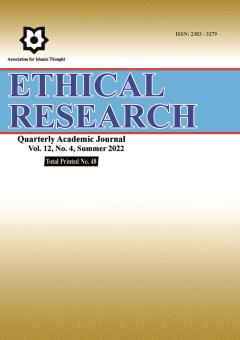Explaining the Relationship between Corruption and Tax Policy Implementation and the Role of Organizational Commitment (Yazd General Administration of Taxation)
Subject Areas : Ethics and Islamic EducationMaryam Ali Omrani 1 , Alireza Manzari Tavakoli 2 * , Sanjar Salajegheh 3
1 -
2 -
3 -
Keywords: Corruption, Tax Policy, Organizational Commitment, Government, Citizens.,
Abstract :
The aim of this study was to explain the relationship between corruption and the rate of implementation of tax policies with respect to the mediating role of organizational commitment in order to provide a favorable model. Regarding the role of moral values in the field of corruption, it can be said that economic poverty and income disorders of employees of organizations, cultural poverty and lack of strong moral beliefs and lack of effective rules and regulations and control systems are among the main causes of corruption and the main factors are form. This phenomenon includes: main causes (roots) and facilitators. The research method is analytical, descriptive and correlational. The statistical population of 500 people included all employees of the General Department of Taxation of Yazd. The sample size according to Morgan table was equal to 221 people who were randomly selected. For data collection, a questionnaire of 20 questions of corruption with a validity of 75. and a reliability of 804. and a questionnaire of 11 questions of tax policy implementation with a validity of 74. and a reliability of 942. and a questionnaire of 24 questions of organizational commitment with a validity of 78. and a reliability of 907 / were used. Data analysis was performed with SPSS and Amos software. Data were collected through a questionnaire and the community of experts as a research tool. In order to analyze the data, statistical tests such as Pearson correlation coefficient and structural equation modeling were used. The research findings in the first step show that corruption has a negative and significant effect on organizational commitment. Also, corruption within the government has a negative and significant relationship with the implementation of tax policy. Organizational commitment as a positive moral characteristic also has a positive and significant effect on the implementation of tax policy. As a result, organizational commitment reduces the effects of corruption on tax policy implementation. Finally, it was shown that organizational commitment indirectly improves the implementation of tax policies and reduces the effects of corruption.
Hosseini, Khodadad. Farhadinejad, Mohsen. (2007) "Investigation of Corruption and its Control Methods". Journal of Management Knowledge. Year 5 Volume 5. Number 1. pp. 22-41. (In Persian).
Treisman D .2006.What we learned about the causes of corruption from ten years of crossnational empirical research . httpw://www.polisci.ucla.edu/faculty/treisman.
Harrison, D.A., Newman, D.A., Roth, P.L., 2006. How importan t are job attitudes? Meta analytic compar isons of integrative behavioral outcomes and time sequences. Academy of Management Journal 49, 305– 325.
Tarihi, Fakhreddin Ibn Mohammad (1996) Bahrain Assembly. Research: Seyed Ahmad Hosseini Eshkori. Tehran: Mortazavi Publications, first edition.P231. (In Persian).
Klitgardrabert (1996) "What can be done", UNESCO Message, No. 313,p35. (In Persian).
lagseth.p.stapenhurst.r and pope .j.1997.the role of a national integrity system in fighting corruption.working paper .economic development institute .world Bank Washington d.c.u.s.A
lambsdorff.j.G .2003.How corruption affects productivity .kyklos .vol.56.no.4.pp.457-474.
court.j.Hyden.G.and Mease .k.2002 .assessing governance Methodological challenges world Governance survey Dscussion paper 2.united nations university.tokyo japan.
Danesh Fard, Karamollah. (2010). General Policy Making Process, First Edition, Islamic Azad University Press, Tehran.p2. (In Persian).
Lindblom. Charles, E (1998)" The Policy Making Process", 2nd ed. Prentice-Hall, Englewood Cliffs, NJ.p11.
Sabatier, P. A.; Mazmanian, D. (1979). The Implementation of Public Policy: A Framework of Analysis. Policy Studies Journal, 8(4),p 22-26.
Edwards, G. C.; Sharkansky, I. (1978). The policy predicament, making and implemention public policy. San Franciso, Freeman and Company.p148&24.
Sabatier, Paul A.; Weible, Christopher M. (2007). A Guide to the Advocacy Coalition Framework. In: Frank, Fischer, and Gerald, J.p31.
Sabatier, Paul A. (1986). Top-down and bottom-up approaches to implementation Research: a critical analysis and suggested synthesis. Public Policy.
Meyer, J.P., Allen, N.J., 1991. A three-componen t concept ualization of organizat ional commitment. Human Resource Management Review 1, 61– 89.
Klein, H.J., Cooper, J.T., Molloy , J.C., Swa nson, J.A., 2014. The assessment of commitment: advantages of a unidimensional, target- free appr oach. Journal of Applied Ps ychology 99, p130.
Meyer, J.P., Herscovitch, L., 2001. Commitment in the workpla ce: toward a general model. Human Resource Management Review 11, 299 .
Habibi, Nader. (1996). "Corruption (effective factors and methods of struggle)." Tehran: Vaseghi Publications. First Edition.p47. (In Persian).
Taherpour Kalantari ,Habibollah, Memarzadeh Tehran Gholamreza, 2008, Factors Affecting the Successful Implementation of Tax Policies Approved by the Parliament, Economic Research Journal, No. 4. (In Persian).
Najjari, Reza, (2000) Causes of administrative violations and how to prevent them, Promoting the health of the administrative system, Tehran, Public Management Training Center.p95-96. (In Persian).
Ghaderi, Mehdi, (2009), Corruption in Iran; Sociological Analysis, Knowledge Monthly, No. 138. (In Persian).
chaferitz, J. M. Steven At, (1998), Classical Theories of Organization, translated by Mohammad Mehdi Naderi Qomi, Qom, Imam Khomeini Educational and Research Institute, Vol.p150. (In Persian).
Naderi Qomi, Mohammad Mehdi, (2009), Knowledge Monthly, Culture in Organization and Management Theory, No. 137. (In Persian)

